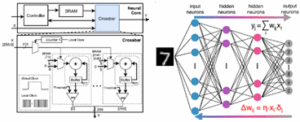24.07.2025Open Position MEP/BEP
Open position MEP: Emulation of quantum many-body states based on spiking neuromorphic systems
Ryoichi Ishihara
Associate Professor, Group leader
Qutech, Dep. Quantum and Computer Engineering, Faculty of Electrical Engineering, Mathematics and Computer Science, Delft University of Technology
Ishihara-lab focuses on the integration technologies for unconventional electronic systems; quantum computers, quantum sensors, neuromorphic computers, and biodegradable sensors. Our work involves new materials, scalable fabrication of electronic and photonic devices, and 3D heterogeneous integration, aiming to realize unconventional electronic systems.
Emulation of quantum many-body states based on spiking neuromorphic systems
Capturing the correlations among constituents of many-body quantum systems is pivotal for accurately describing various quantum phenomena, such as superconductivity[3]. However, simulating such systems poses significant computational challenges. Variational representations like Neural Quantum States (NQS), based on artificial neural networks, have shown promise in efficiently representing such systems[4]. However, the computational complexity of NQS scales with both the size of the physical system and the neural network[3]. This proposal aims to explore the potential of spiking neuromorphic systems in emulating quantum many-body states efficiently.
Objectives:
- Investigate the feasibility of using spiking neuromorphic systems for emulating quantum many-body states.
- Develop algorithms and methodologies for encoding quantum many-body states into spiking neuromorphic systems.
- Evaluate the scalability and efficiency of the proposed approach in capturing emergent phenomena in condensed matter physics.
- Compare the performance of spiking neuromorphic systems with traditional computational methods for simulating quantum many-body systems.
Methodology:
- Literature Review: Conduct an extensive review of existing literature on quantum many-body systems, NQS, and spiking neuromorphic systems.
- Algorithm Development: Develop algorithms for encoding quantum many-body states into spiking neuromorphic systems, considering scalability and computational efficiency.
- System Design: Design and implement a prototype system based on memristors for emulating quantum many-body states using spiking neuromorphic system such as BrainScaleS-2 or same platform as the proposal 1 (FPGAs/CGRAs)[2].
- Experimentation: Conduct experiments to validate the effectiveness and efficiency of the proposed approach in capturing emergent phenomena in quantum many-body systems.
- Evaluation: Evaluate the performance of the spiking neuromorphic system in comparison to traditional computational methods.

Architecture of a neural core with 256 input and 256 output neurons [5] and schematic representation of an artificial neural network [1].
References:
[1] P. Mannocci, M. Farronato, N. Lepri, L. Cattaneo, A. Glukhov, Z. Sun, D. Ielmini, In-memory computing with emerging memory devices: Status and outlook, APL Machine Learning, 1 (2023).
[2] J. Anderson, R. Beidas, V. Chacko, H. Hsiao, X.Y. Ling, O. Ragheb, X.Y. Wang, T.Y. Yu, CGRA-ME: An Open-Source Framework for CGRA Architecture and CAD Research (Invited Paper), Ieee Int Conf Asap, (2021) 156-162.
[3] R. Klassert, A. Baumbach, M.A. Petrovici, M. Gärttner, Variational learning of quantum ground states on spiking neuromorphic hardware, Iscience, 25 (2022).
[4] A. Anshu, S. Arunachalam, A survey on the complexity of learning quantum states, Nat Rev Phys, 6 (2024) 59-69.
[5] T. Luo, et al., “An FPGA-Based Hardware Emulator for Neuromorphic Chip With RRAM,” Ieee T Comput Aid D, vol. 39, no. 2, 2020, pp. 438-450; DOI 10.1109/Tcad.2018.2889670.
Interested? Please contact Ryoichi Ishihara r.ishihara@tudelft.nl or Erbing Hua <E.Hua@tudelft.nl>